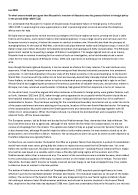There are a number of foreign policy successes prior to the invasion of Abyssinia which could be seen to be more successful. As well as his success with regards to the Corfu incident, where he forced the Greek government to back down and pay compensation to Italy for the deaths of 4 Italian workers working on Greek soil, his involvement in the Locarno Treaty, Kellog-Briand Pact and the Stresa Front were undoubtedly much more successful than the invasion of Abyssinia.
His participation at these conferences improved his standing in Europe, and made him stand up and be counted as a serious, leading statesman of Europe. At the Stresa Front, he was shown to be a strong and brave leader in standing up to Nazi Germany for it’s disobedience of the terms of the Treaty of Versailles. This resilience and determination to prevent the growth of Nazi Germany was again shown when he attempted to prevent Anschluss between Germany and Austria. After the assassination of Austrian leader Dolfuss, a close personal friend of Mussolini’s, Mussolini labelled Hitler a “horrible sexual degenerate”.
He gained enormous prestige from his participation – he also saw them as fantastic propaganda opportunities and turned them into diplomatic spectacles, often arriving by speedboat or flanked by a vast entourage, giving him the impression of a powerful, influential figure. The fact that both the Locarno and Stresa conferences were held in Italy further enhanced the belief that Italy was now a leading power in European and International affairs.
In addition to the successes mentioned above, Mussolini also achieved great success when he acquired the coastal town of Fiume in the 1924 Pact of Rome. This agreement with the newly formed Yugoslavia saw them hand over control of Fiume, a long-held target of Italian territorial ambitions, to Italy. He was praised for standing up for Italy and for his achievement through diplomatic methods.
Another of his foreign policy successes was the acquirement of Albania as a satellite state. The Italian government supplied Ahmed Zog with money and employed Italian officers as advisors to the Albanian army. Italy’s involvement with Albania posed a military threat to Yugoslavia, while at the same time strengthening Italy’s position in the Balkans. Mussolini had been angry that France’s involvement in the Balkans was undermining Italy’s strength in the region.
Finally, after the invasion of Abyssinia, Mussolini had only one success – his involvement in the Munich conference. As with the previous conferences and treaties he had been involved with, he did not actually pay much attention to the details of the conference – he merely used it as a propaganda opportunity and was portrayed as a peace-maker between Chamberlain of Britain and Hitler’s Nazi Germany.
Despite the obvious successes of the invasion of Abyssinia, the failures greatly outweigh them. The entire campaign was, in fact, masked by propaganda – like many of Mussolini’s successes, it was greatly exaggerated by propaganda. Had the Italian people known the true extent of Italy’s economic troubles and it’s inefficiently fought campaign, it is unlikely that they would have been so adoring and full of praise for Mussolini.
The war, despite being relatively short, was a massive drain on Italian economic and military resources – the budget deficit rose from 2.5 billion to 16 billion Lire during the war. In addition to this, the economic problems led to the lira being devalued by 40% in October 1936. The campaign was very poorly fought – despite their enemies not being prepared for modern warfare, the Italian forces struggled to overcome them and the mountainous terrain worked to the advantage of the poorly armed Ethiopian forces. In all, 400,000 troops were sent to fight in this small colonial campaign and this, together with an unnecessary mountain of equipment, led to much confusion.
In reality, Ethiopia was never truly conquered – despite the repressive and corrupt Italian rule, fierce guerrilla fighting continued throughout Italy’s occupation of the country and at times reduced the area under control to little more than the few main towns. The Italian attack had united Ethiopia’s warring tribes and their guerrilla attacks were difficult for the inexperienced Italian forces to deal with.
Internationally, Mussolini’s reputation plummeted and the reaction had not been the one that he had expected. He was condemned for his attack on Ethiopia, who was at the time a member of the League of Nations. This led to sanctions being imposed on Italy and meant that no country was allowed to carry out arms sales with Italy and League of Nations members banned the import of Italian goods. This was a further blow to the already ailing Italian economy.
In conclusion, I do not agree with the comment “Mussolini’s invasion of Abyssinia was his greatest foreign policy success in the period 1922-38”. The obvious successes cannot be ignored, but these successes were clearly exaggerated by Mussolini’s excellent application of propaganda. With regards to Abyssinia, the effect it has on Italy’s economy and the damage it does to Mussolini’s reputation outweigh the successes.







